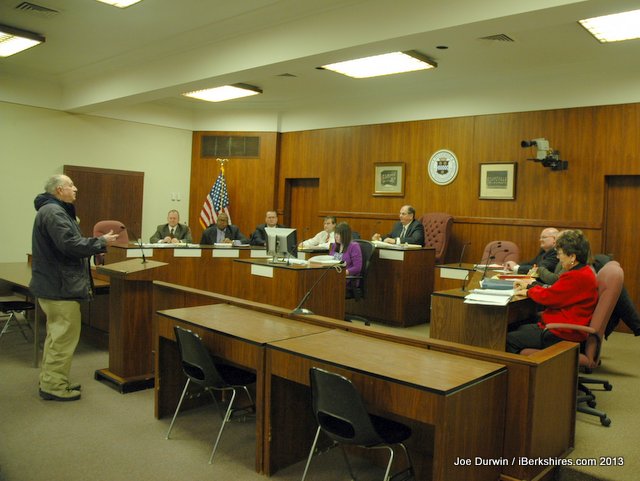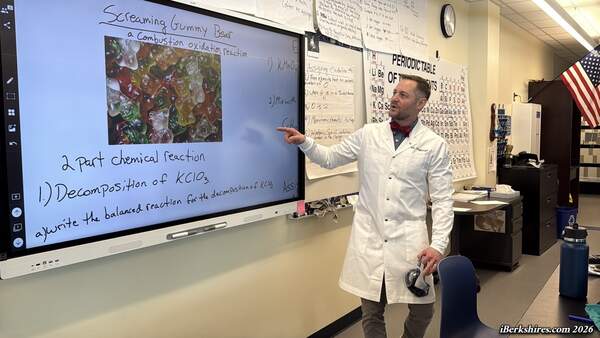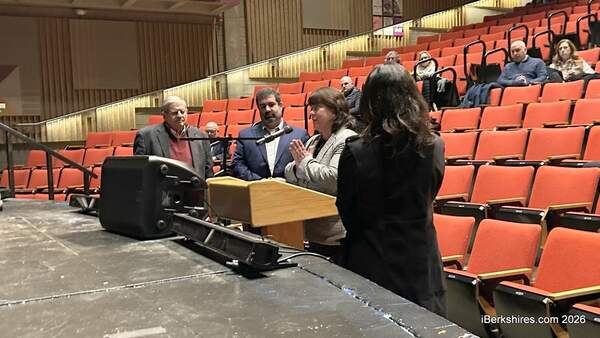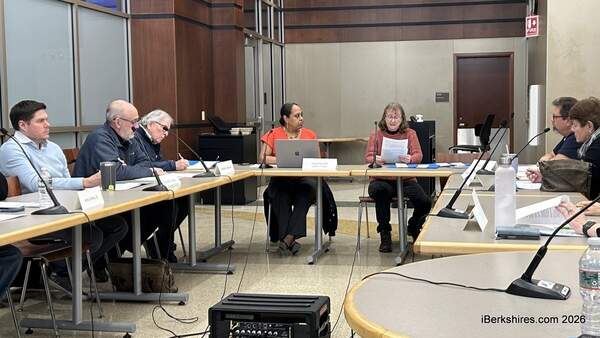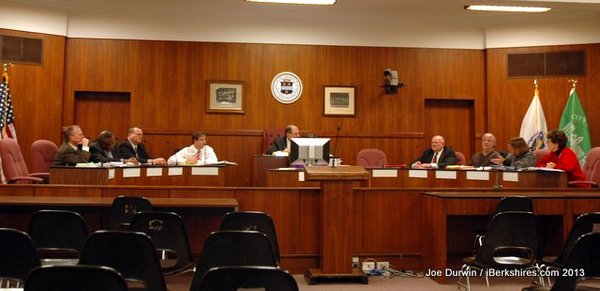
Pittsfield Charter Committee Discards City Manager Option
|
James Boyle of Cheshire, a former Pittsfield councilor and School Committee member, addresses the charter committee. Few residents have attended the committee's meetings. |
PITTSFIELD, Mass. — Consensus on some major points of Pittsfield governance began to emerge Wednesday, following a public hearing held by the city's special Charter Review Study Committee.
By unanimous vote of nine members present Wednesday, the committee appointed to review the city's 80-year-old charter document voiced an early inclination toward expanding the term of mayor to four years and dispensing with the concept of adding a city manager. It also favors keeping the mayor as a voting member of the School Committee, and reducing the number of signatures needed to run for such offices as at-large city councilor, city clerk and School Committee.
The votes indicate merely an expression of consensus in the committee's current leanings in a larger non-binding process expected to continue for several more months, at the end of which time the complete recommendations for a revised city charter will be handed over to the City Council and mayor. Any potential change to the document would also have to be approved by the state Legislature and go before Pittsfield residents for a vote.
"I think we need to start making some decisions," said Chairman Judge Edward Lapointe, on moving on from further discussion of the city manager idea. "We can always revisit the vote, but I think we ought to bring certain issues to a head."
Having the City Council hire a manager to administrate much of the day-to-day operations of municipal government, as is seen in a few cities in Massachusetts, was panned by a panel of Pittsfield mayors, as well as the city clerk, but proved popular with several city councilors.
Committee member Diane Ferrero said residents she'd talked to were "alarmed" by talk of a city manager. "People really like the tradition, and I think it's a feature of our culture here that people for vote for the mayor."
Vice Chairman Peter Marchetti, who narrowly missed election as mayor in 2011, pointed out that of the more than 12,000 voters in that municipal election, only 52 failed to cast a vote for mayor.
Hired consultants from the Collins Center for Public Management had explained to the committee in prior sessions that most cities which have opted for a city manager system of government have done so as a result of a major crisis.
"It does not seem that our current system is broken, so I don't think that we should get rid of a system that's working," agreed David W. Murphy Jr.
The public hearing that preceded these determinations was the sixth meeting of the temporary committee, most of which have been devoted to taking input from current and former elected officials. Sparsely attended, only eight residents spoke, three of them officials who had already addressed the committee at previous meetings.
Jeff Hunt, who served on a previous charter committee in the 1990s, offered some background on the process of that effort, along with some general advice that the committee be mindful of separating the charter from issues which could more appropriately be dealt with through ordinances and city code.
"Some ideas may be better on the council level than the charter level," said Hunt. "The charter's supposed to be hard to change.... I hope you keep in mind that any changes to the charter should be widely supported, nearly unanimous, in order to make it through the process."
|
— Jeff Hunt |
Pittsfield resident Daniel Colello urged the committee to look closely at the tax impact on citizens before creating any new positions via charter revisions, either that of a city manager or the concept of an enhanced administrative assistant or "chief of staff" position created under the mayor. He also spoke out against compensation for School Committee members, an idea that has heretofore proved popular.
"Get a good look at the city, get a good luck at the positions in the city," said Colello. "I think it's time to justify those [existing] positions before we start spending more money and raising our taxes every year."
The committee was more split on the creation of a chief of staff position, with David Murphy, William Barry and Vicki Kane voting opposed, pending further deliberation.
A 9-0 vote was taken in favor of not specifying term limits for mayors. Currently, only 9 percent of charters in Massachusetts have term limits.
On the scant level of public input received so far, Kane encouraged any public watching to visit the city's website for documents and resources, and to email the committee's clerk through the charter page with any written input.
"We really hadn't vocalized any of our opinions," said Marchetti, who predicted that more input would likely be forthcoming as the committee began making its consensus known on some issues. "To date, we've just been gathering information."
"We will have another public hearing in due course," said Lapointe, pointing out that there is also an opportunity for brief public comment at the beginning of each meeting. The committee will convene again on Jan. 15.
Tags: charter review,

